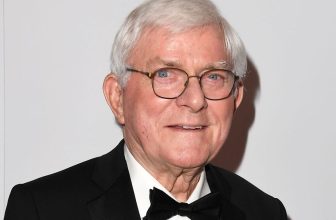
Glenda Jackson, the widely acclaimed British actress of star and screen, has died at 87. A two-time Oscar winner, Jackson retired from acting for a two-decade career in British Parliament, but later returned to acting with acclaimed stage work.
Jackson died after a “brief illness,” according to her agent Lionel Larner.
“One of the world’s greatest actresses has died, and one of my best friends has died as well,” Larner told NPR.
Jackson was born in Birkenhead, England on May 9, 1936. According to NPR, she grew up working class poor in a flat with an outdoor toilet. But after these humble beginnings, she won a scholarship to study acting at the prestigious Royal Academy of Dramatic Art in London.

She joined the Royal Shakespeare Company in 1964, receiving positive reviews for roles like Ophelia in Hamlet. Jackson’s performance as Charlotte Corday in Marat/Sade was a breakout role, establishing her as an intense and fearless actress; she later reprised the role on Broadway and in a film adaptation.
“I like to take risks, and I want those risks to be larger than the confines of a structure that’s simply meant to entertain,” she told The New York Times in 1971.
Her success on the stage translated into film. She won the Academy Award for Best Actress twice, for the 1968 romantic drama Women in Love and the romantic comedy A Touch of Class. She was also nominated for Sunday Bloody Sunday and Hedda.

Jackson won two Primetime Emmy Awards for playing Queen Elizabeth I in the serial Elizabeth R. In 1978, she received the honor of Commander of the Order of the British Empire (CBE) from Queen Elizabeth II.
Jackson continued to be regarded as one of her generation’s finest stage actresses. In the 1980s, she played Lady Macbeth on Broadway and also starred in Eugene O’Neill’s Strange Interlude, receiving Tony nominations for both.
But in 1992, Jackson stepped away from acting for a new career in British politics. She was motivated both by her disdain for the policies of Margaret Thatcher, and by the lack of quality acting roles available to her at middle age.
“Certainly, the life of an actress in films is very short. And in the theater, there’s a terrible trough when there are no parts worth playing,” Jackson said in an interview, per NPR. “I mean, until you sort of hit about 60 and then a few sort of cracking character parts. And I really can’t see myself hanging around for 20 years waiting to play an old biddy in something.”
She was elected to Parliament representing the London constituency of Hampstead and Highgate, as a member of the Labour Party. During her time as an MP, her party regained power under Prime Minister Tony Blair, and she became a junior minister of transport.
Over her political career, Jackson tackled issues including transportation, women’s rights, homelessness and disability issues. She was highly critical of the policies of Margaret Thatcher and Conservative government, and opposed Britain’s role in the Iraq War.

After more than 20 years of political service, Jackson made another career pivot: she decided not to run for re-election in 2015, saying she was too old, and returned once again to acting.
She made a splashy, ambitious return to the stage in her 80s by playing the gender-swapped title role in King Lear, in productions in London and on Broadway. She received widespread acclaim for her comeback.
Jackson also won her first Tony Award in 2018 for her performance in Edward Albee’s Three Tall Women, making her one of the few people to win the “Triple Crown of Acting” — an Oscar, Emmy and Tony.
Jackson’s final film role is the upcoming The Great Escaper, in which she stars opposite Michael Caine.
Rest in peace to the great Glenda Jackson — one of the best actresses of her generation 💔





GIPHY App Key not set. Please check settings